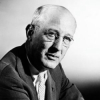Bruce Catton

Bruce Catton
Charles Bruce Cattonwas an American historian and journalist, best known for his books on the American Civil War. Known as a narrative historian, Catton specialized in popular history, featuring colorful characters and historical vignettes, in addition to the basic facts, dates, and analyses. Although his books were well researched and supported by footnotes, they were not generally presented in a rigorous academic style. He won a Pulitzer Prize in 1954 for A Stillness at Appomattox, his study of the final...
NationalityAmerican
ProfessionHistorian
Date of Birth9 October 1899
CityPetoskey, MI
CountryUnited States of America
Like most Rebel soldiers, Sam Watkins owned no slaves.
The Confederate Constitution was almost identical to that of the United States.
Yet there is a dignity in the human spirit which can become most clearly visible in the moment of defeat and disaster.
Men see things late, and it may be that at times an evil fate drives them on.
Abraham Lincoln was not all brooding and melancholy and patient understanding. There was a hard core in him, and plenty of toughness. He could recognize a revolutionary situation when he saw one, and he could act fast and ruthlessly to meet it.
History does not usually make real sense until long afterward.
What a general could do, Thomas did; no more dependable soldier for a moment of crisis existed on the North American continent, or ever did exist... Thomas comes down in history as the Rock of Chickamauga, the great defensive fighter, the man who could never be driven away but who was not much on the offensive. That may be a correct appraisal, Yet it may also be worth making note that just twice in all the war was a major Confederate army driven away from a prepared position in complete rout - at Chattanooga and at Nashville. Each time the blow that routed it was launched by Thomas.
It began with one act of madness, and it ended with another. John Brown heard history's clock strike in the night and tried to hurry dawn along with gunfire; now John Wilkes Booth heard the clock strike, and he tried with gunfire to restore the darkness. Each man stood outside the human community, directed by voices the sane do not hear, and each kept history from going logically... The line from Harper's Ferry to Ford's Theater is a red thread binding the immense disorder of the Civil War into an irrational sort of coherence.
And there is the headlight, shining far down the track, glinting off the steel rails that, like all parallel lines, will meet in infinity, which is after all where this train is going.
A certain combination of incompetence and indifference can cause almost as much suffering as the most acute malevolence.
Even the most painstaking history is a bridge across an eternal mystery.
Progress is the sum of small victories won by individual human beings.
The enduring realization that when a great challenge comes, the most ordinary people can show that they value something more than they value their own lives. When the last of the veterans had gone, and the sorrows and bitterness which the war created had at last worn away, this memory remained.
Sooner or later you must move down an unknown road that leads beyond the range of the imagination, and the only certainty is that the trip has to be made